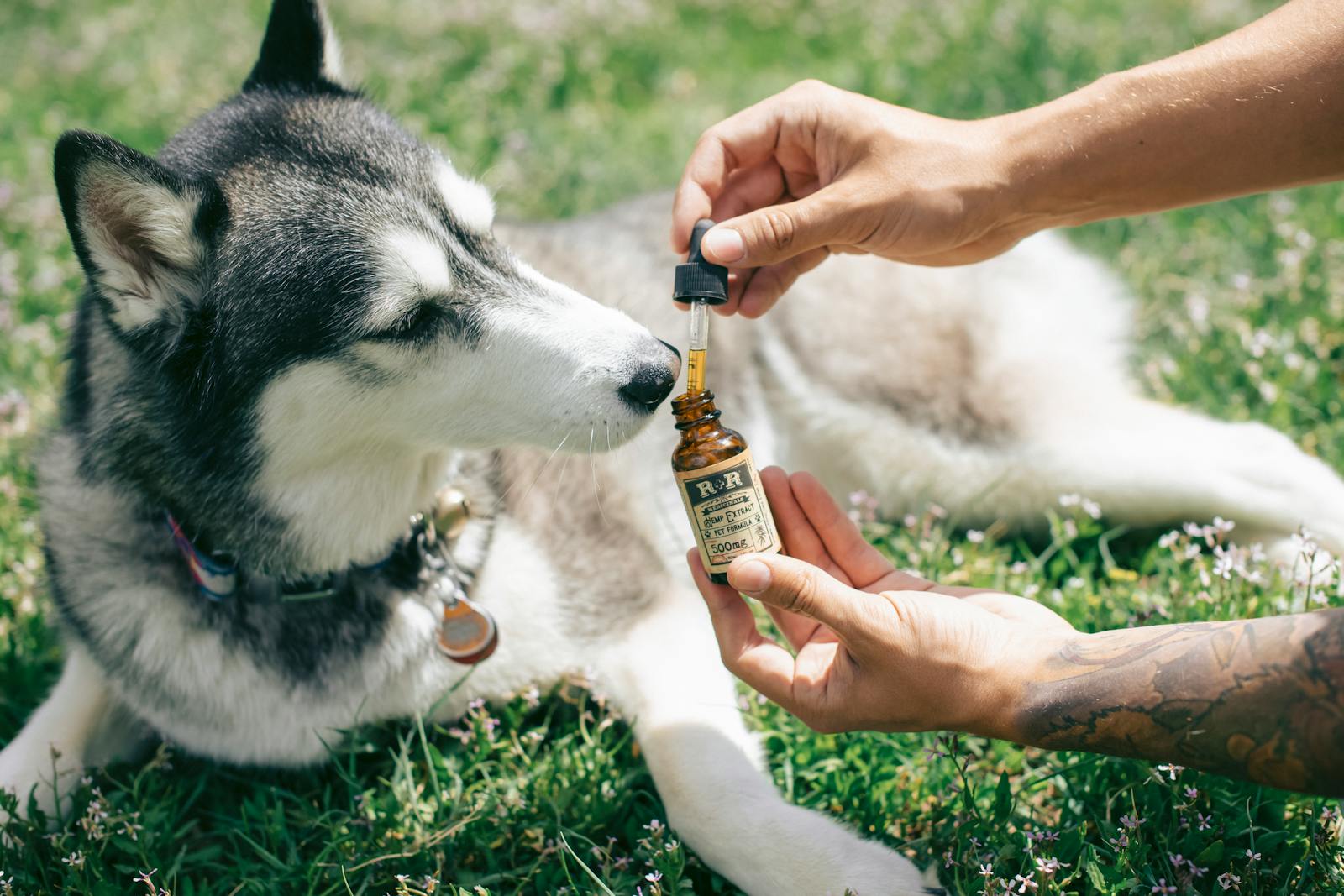Every dog owner wants the best for their furry friend. From the food they eat to their lifestyle habits, every choice plays a role in their overall health. Among the many supplements that can benefit your dog, omega oil shines as a powerful addition to their diet. But why is omega oil so important for dogs, and how can it improve their well-being? Let’s explore everything you need to know about omega oil for dogs, its benefits, and how to integrate it into your pet’s daily routine.

What is Omega Oil for Dogs?
Omega oil is a rich source of omega fatty acids, essential nutrients that play a crucial role in maintaining your dog’s overall health. Omega oil can come from both animal-based (like fish oil, krill oil, and salmon oil) and plant-based sources (such as flaxseed oil). These oils are packed with omega-3 fatty acids, which include eicosapentaenoic acid (EPA) and docosahexaenoic acid (DHA). These are important components for supporting your dog’s skin, coat, joints, heart, brain, and immune health.

Health Benefits of Omega Oil for Dogs
Adding omega oil to your dog’s diet offers great benefits for their overall health. Some of the key benefits include the following:
1. Shiny Coat Health and Healthy Skin
Does your dog suffer from dry, itchy skin or a dull coat? Omega oil has been proven to promote skin health and provide a shinier, healthier coat. Omega-3 fatty acids help reduce inflammation, combating common skin problems like flakiness, allergies, and irritation. Regular intake of fish oil, such as salmon oil or krill oil, can lead to visible improvements in your dog’s fur, leaving your dogs coat soft and lustrous.
2. Improved Joint Health
Aging dogs often experience joint pain and stiffness due to arthritis. Omega oil plays a crucial role in supporting joint function by reducing inflammation in joints. This can make a significant improvement in mobility, helping older dogs get back to doing what they love most, like playing and running. Many pet parents rely on omega oil as part of their dog’s arthritis treatment plan.
3. Boosted Immune System
A strong immune system is vital for protecting your dog against common health problems. Omega-3 fatty acids in fish oil products support your dog’s immune system, fortifying their natural defenses against illnesses. For pet owners looking for a proactive approach, omega oil can help prevent health complications from arising in the first place.
4. Heart and Cognitive Function
The benefits of omega oil go beyond physical health. EPA and DHA in omega-3s are essential for heart health, helping prevent heart disease and blood clots in dogs. Additionally, omega oils support cognitive function, fostering brain health and improving your pet’s memory and focus. Supplementing with omega oil also plays an important role in supporting your dog’s nervous system, especially in senior dogs.
5. Better Overall Well-being
Omega oil contributes to improved overall health, enabling your dog to thrive at every life stage. From enhanced cognitive function to better digestion and energy levels, omega oil is a must-have for improving your dog’s well-being at every step of their life.

Top Sources of Omega Oil for Dogs
Omega oil can be derived from several natural sources. Here are some common options to consider when shopping for the best supplements for your furry friend:
1. Fish Oil For Dogs
Fish oil is one of the best natural sources of omega-3 fatty acids. Extracted from fatty cold-water fish like salmon, mackerel, and sardines, fish oil supplements offer high levels of EPA and DHA. Fish oil for dogs is widely available and easy to integrate into wet food or daily meals. However, some fish oil smells fishy and may require a human-grade option for better quality and odor.
2. Krill Oil
Krill oil, sourced from small crustaceans, is another excellent option for omega oils. It typically has a higher antioxidant content than fish oil, improving its shelf life while delivering effective results.
3. Flaxseed Oil
For dogs who are sensitive to fish-based supplements or thrive on plant-based sources, flaxseed oil is an ideal alternative. It is rich in alpha-linolenic acid (ALA), which the body converts into EPA and DHA. However, note that the conversion process may be less efficient in some dogs, making fish oil a better choice for higher omega-3 intake.
4. Other Natural Oils
Some oils, like salmon oil and synthetic triglyceride oil, are specifically designed for pets. They are easy to measure and include in your dog’s food, making them convenient options for busy pet parents.

How Much Omega Oil Should You Give Your Dog?
Dosage is everything when it comes to omega oil. Too little, and your dog may not get the desired result; too much could cause side effects like loose stools. Generally, the amount of fish oil your dog needs depends on their body weight.
Here’s a rough guide for how much fish oil to give your dog:
- Small dogs (<20 lbs): 300-500 mg of EPA/DHA per day
- Medium dogs (20-50 lbs): 700-1,000 mg of EPA/DHA per day
- Large dogs (>50 lbs): 1,500 mg or more of EPA/DHA per day
Always consult your vet before introducing any fish oil products or making changes to your dog’s diet to ensure it’s the right fit for their health needs.
Things to Consider When Choosing Omega Oil
- Quality: Look for human-grade fish oil to ensure purity and quality.
- Added Vitamin E: Fish oil may deplete vitamin E in your dog’s body, so choose supplements with added vitamin E to avoid deficiencies.
- Packaging & Shelf Life: Omega oils should come in dark or opaque containers to prevent oxidation. Always store them in a cool, dry place for maximum freshness.

How to Integrate Omega Oil into Your Dog’s Routine
Introducing omega oil into your dog’s diet is simple! Here are three tips to get started:
- Mix with Food: Adding omega oil to your dog’s wet food or kibble makes it easier to digest and enjoy.
- Start Small: Begin with smaller doses and gradually increase to the suggested daily amount to monitor how your dog reacts.
- Pair with Other Treatments: Omega oil works well when paired with a holistic approach. Combine it with a balanced diet and other activities to maximize your dog’s health and wholeness.
When to Consult Your Veterinarian
While omega oil offers numerous health benefits for dogs, there are specific circumstances where it’s crucial to consult your veterinarian before introducing it into your pet’s diet:
- Pre-existing Health Conditions: If your dog has any pre-existing health issues such as kidney disease, pancreatitis, or bleeding disorders, consulting your vet is vital. Certain conditions may require adjusted dosages or may not be compatible with omega oil supplementation.
- Puppies or Pregnant Dogs: Puppies and pregnant or nursing dogs have unique nutritional requirements. Your veterinarian can advise on whether omega oil is appropriate and recommend the correct dosage tailored to these stages of life.
- Interactions with Medication: If your dog is currently taking prescription medications or undergoing treatment for an illness, omega oil may interact with these drugs. A professional can ensure the supplement won’t interfere with your pet’s treatment plan.
- Allergies or Sensitivities: Dogs with specific allergies or sensitivities, especially to fish or marine-based products, may require alternative forms of omega oils or need to avoid them altogether. Your vet can guide you on suitable options.
- Excess Weight or Obesity: Omega oil is calorie-dense, and for overweight dogs, unregulated supplementation could hinder weight management efforts. A veterinarian can help you integrate omega oil into a balanced diet plan.
By seeking advice from your veterinarian in these scenarios, you can safely incorporate omega oil into your dog’s routine while addressing their individual needs and ensuring their well-being.
Top 6 Dog Omega Oil Products and Brands
Here are some of the best omega oil products for dogs, offering high-quality ingredients designed to promote their overall health and wellness.
- Grizzly Salmon Oil for Dogs: Made from pure wild-caught Alaskan salmon, this oil is rich in omega-3 fatty acids and supports skin, coat, and joint health. Buy here
- Nordic Naturals Omega-3 Oil for Pets: Formulated with sustainably sourced fish oil, this product contains DHA and EPA to support your dog’s brain, heart, and immune system. Buy here
- Zesty Paws Pure Salmon Oil: A premium-grade product made from wild Alaskan salmon, it helps maintain a shiny coat and addresses dry, itchy skin issues. Buy here
- Welactin Canine Omega-3 Supplement: Derived from cold-water fish, this veterinarian-recommended supplement provides concentrated omega-3 fatty acids for cardiovascular and joint health. Buy here
- Amazing Omega Pet Fish Oil: Offering a balanced blend of EPA and DHA, this product is designed to support coat shine, reduce shedding, and improve mobility. Buy here
- Vital Pet Life Salmon Oil for Dogs: This all-natural, cold-pressed salmon oil is a great source of essential fatty acids to enhance your pet’s skin, coat, and overall vitality. Buy here
Before purchasing, always consult with your veterinarian to determine the best option and dosage for your dog’s specific needs.

Bring your pup to Snouts and Stouts Indoor Dog Park and Bar for a day full of healthy fun.
Give Your Dog the Gift of Better Health
Adding omega oil to your dog’s daily routine can transform their health, skin, coat, and overall well-being. From reducing inflammation to preventing heart disease and boosting their immune system, omega oil truly holds the power to make a difference in your dog’s life.
Consult your vet today to ensure you’re choosing the best supplements for your pet, and provide them with all the nutrition they need to live their best life.




